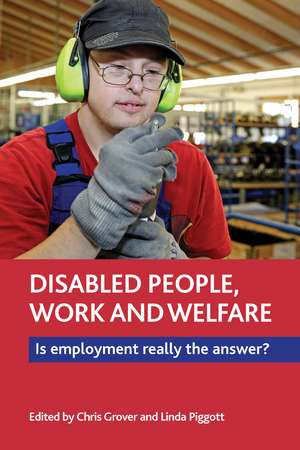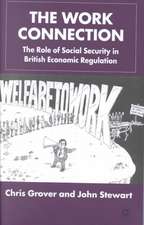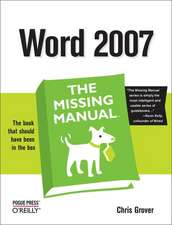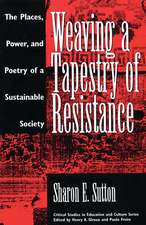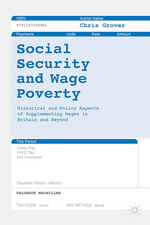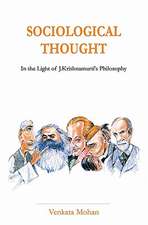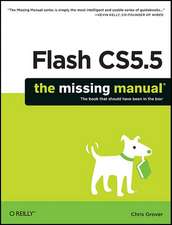Disabled People, Work and Welfare: Is Employment Really the Answer?
Editat de Chris Grover, Linda Piggotten Limba Engleză Hardback – 30 iun 2015
This is the first book to challenge the idea that paid work should be seen as an essential means to independence and self-determination for the disabled. Writing in the wake of attempts in many countries to increase the employment rates of disabled people, the contributors show how such efforts have led to an overall erosion of financial support for the disabled and increasing stigmatization of those who are not able to work. Drawing on sociology and philosophy, and mounting a powerful case for the rights of the disabled, the book will be essential for activists, scholars, and policy makers.
Preț: 834.91 lei
Preț vechi: 1084.29 lei
-23% Nou
Puncte Express: 1252
Preț estimativ în valută:
159.84€ • 166.77$ • 133.98£
159.84€ • 166.77$ • 133.98£
Carte tipărită la comandă
Livrare economică 13-27 martie
Preluare comenzi: 021 569.72.76
Specificații
ISBN-13: 9781447318323
ISBN-10: 1447318323
Pagini: 256
Ilustrații: 5 tables, 3 figures
Dimensiuni: 152 x 229 x 23 mm
Greutate: 0.66 kg
Editura: Bristol University Press
Colecția Policy Press
ISBN-10: 1447318323
Pagini: 256
Ilustrații: 5 tables, 3 figures
Dimensiuni: 152 x 229 x 23 mm
Greutate: 0.66 kg
Editura: Bristol University Press
Colecția Policy Press
Notă biografică
Chris Grover is a senior lecturer in social policy at Lancaster University, where Linda Piggott was, until her retirement, a lecturer in applied social science.
Cuprins
Disabled people, work and welfare
Chris Grover and Linda Piggott
Part One: Changing constructions of disability and welfare
Disabled people, conditionality and a civic minimum in Britain: reflections from qualitative research
Ruth Patrick and Deborah Fenney
Doing the 'hard yakka': implications of Australia's workfare policies for disabled people
Alan Morris, Shaun Wilson and Karen Soldatic
Part Two: Social policy, work and disabled people
Why are the policies and organisations seeking to help disabled people access work failing?
Bruce Stafford
Disabled people, welfare reform and the balance of rights and responsibilities
Dan Heap
Disabled people and employment in Poland
Monika Struck-Peregonczyk
Disability and employment in the United States: the intersection of healthcare reform and welfare-to-work policy
Randall Owen, Robert Gould and Sarah Parker Harris
Social dialouge, partnership and the Danish model of activation of disabled people: challenges and possiblities in the face of austerity
David Etherington and Jo Ingold
Part Three: Assistance and access to paid work
Employment experiences and outcomes of young people in Scotland who are deaf or hard of hearing: intersections of deafness and social class
Mariela Fordyce and Sheila Riddell
Supply- and demand-side policies and the employment of learning disabled people in Britain
Sarah Woodin
How can integrated services help sick and disabled people remain in employment? Findings from an evaluation of an in-work support service in the North of England
Jon Warren, Kayleigh Garthwaite and Clare Bambra
Part Four: Alternatives to, and validated lives beyond, paid work
Thinking differently about 'work' and social inclusion for disabled people
Edward Hall and Robert Wilton
A right not to work and disabled people
Chris Grover and Linda Piggott
Disability, work and welfare: the disappearance of the polymorphic productive landscape
Alan Roulstone
Part Five: Conclusion
Themes in Disabled people, work and welfare
Chris Grover and Linda Piggott
Chris Grover and Linda Piggott
Part One: Changing constructions of disability and welfare
Disabled people, conditionality and a civic minimum in Britain: reflections from qualitative research
Ruth Patrick and Deborah Fenney
Doing the 'hard yakka': implications of Australia's workfare policies for disabled people
Alan Morris, Shaun Wilson and Karen Soldatic
Part Two: Social policy, work and disabled people
Why are the policies and organisations seeking to help disabled people access work failing?
Bruce Stafford
Disabled people, welfare reform and the balance of rights and responsibilities
Dan Heap
Disabled people and employment in Poland
Monika Struck-Peregonczyk
Disability and employment in the United States: the intersection of healthcare reform and welfare-to-work policy
Randall Owen, Robert Gould and Sarah Parker Harris
Social dialouge, partnership and the Danish model of activation of disabled people: challenges and possiblities in the face of austerity
David Etherington and Jo Ingold
Part Three: Assistance and access to paid work
Employment experiences and outcomes of young people in Scotland who are deaf or hard of hearing: intersections of deafness and social class
Mariela Fordyce and Sheila Riddell
Supply- and demand-side policies and the employment of learning disabled people in Britain
Sarah Woodin
How can integrated services help sick and disabled people remain in employment? Findings from an evaluation of an in-work support service in the North of England
Jon Warren, Kayleigh Garthwaite and Clare Bambra
Part Four: Alternatives to, and validated lives beyond, paid work
Thinking differently about 'work' and social inclusion for disabled people
Edward Hall and Robert Wilton
A right not to work and disabled people
Chris Grover and Linda Piggott
Disability, work and welfare: the disappearance of the polymorphic productive landscape
Alan Roulstone
Part Five: Conclusion
Themes in Disabled people, work and welfare
Chris Grover and Linda Piggott
Recenzii
“Grover and Piggott offer a compelling challenge to those who view paid work as the only route out of poverty for disabled people. Their book should be essential reading for scholars of disability studies and social policy, and for policy makers interested in supporting disabled people.”
